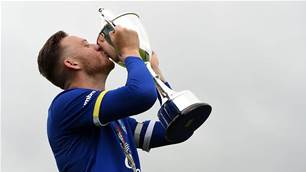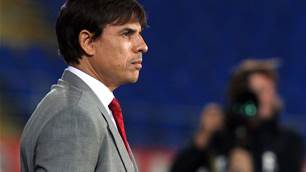The news of Gary Speed's death comes at a time when he was riding a crest of a wave professionally.
The 42-year-old's transition from well-respected player to manager may initially have been a rocky one but the past three months had seen his reputation soar.
Of their five games since the beginning of September, Wales had won four and their only defeat of that spell, a slender 1-0 loss to England, could easily have been a draw or better.
On the back of those results, Wales have shot up from 117th in FIFA's world rankings to 50th and there was genuine optimism looking ahead to next year's World Cup qualification campaign.
That was a mood in marked contrast to just over a year ago when John Toshack left the managerial post amid much doom and gloom.
Toshack had gone into the Euro 2012 qualifiers confident. With talent of the likes of Gareth Bale, Aaron Ramsey - although injured at the time - and Craig Bellamy at his disposal, along with a clutch of other up-and-coming players, he had the right to be.
Yet a defeat in Montenegro changed the mood and after six years in charge, Toshack accepted it was time to move on.
Speed took over in December when, after two more defeats under the caretaker charge of Brian Flynn, qualification was almost out of reach.
On the surface, he did little to change things and successive defeats to the Republic of Ireland, England and Scotland hardly suggested the new regime would be successful.
Yet behind the scenes Speed was working hard, restoring the faith of the players in the national team set-up.
He felt a change was as good a rest in moving the team from their long-established base at the well-appointed Vale of Glamorgan complex to the even more luxurious Celtic Manor at Newport.
He brought in a new backroom staff, different training methods and an approach to fitness and nutrition more akin to the Premier League methods the players were accustomed to.
In addition, there was the bold decision to appoint Arsenal midfielder Ramsey, at the age of just 20 and having only just recovered from serious injury, as his captain in March.
Gunners boss Arsene Wenger had his doubts but it was a decision vindicated by the confidence the impressive Ramsey has played with since.
Speed's spell as Sheffield United manager prior to taking charge of Wales was not successful but, like Mark Hughes before him, he found the national team allowed him the space to grow into the job.
It was hard not to be struck by his determination and thoroughness and, having only recently finished playing himself, he empathised with as well as enthusing those he worked with.
Ultimately, Speed may well be remembered more as one of the finest players of his generation having served Leeds, Everton, Newcastle, Bolton and Sheffield United with great distinction.
But he was also proving himself a bright managerial talent and, as a genuinely nice man at ease with and helpful to the media, his loss will be felt acutely.
Related Articles

Former Everton Aussie now starring at 'very attacking' Bolton

Welsh minnows unveil reversible football jersey












